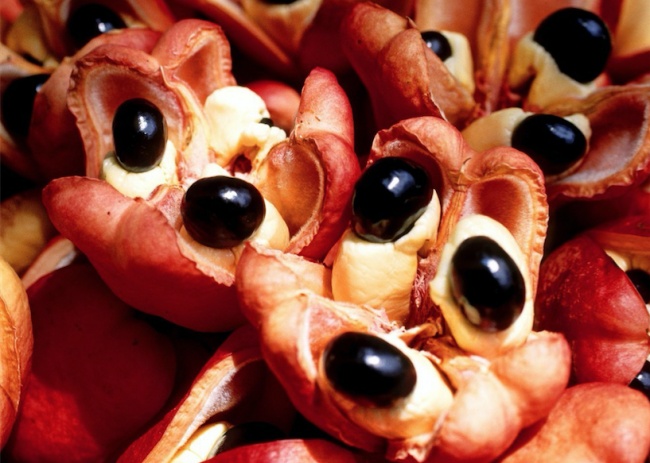
Did you know that in some countries ackee pods are crushed and thrown into the water, causing somewhat of a narcotic effect on the fish, making them rise to the surface for an easier catch?
Ackee is nutritious and delicious fruit that is a popular addition to many exotic dishes and has become a mainstay in Caribbean cuisine, both for its flavour and its beneficial properties. Ackee, when ripe, will split to reveal three large black seeds surrounded by spongy flesh called the aril, which is the edible part of the fruit.
A diet that includes ackee can help to to lower blood pressure, boost energy levels, support healing and growth, aid in digestion, protect against diabetes, lower cholesterol, build strong bones, improve the immune system, and increase circulation.
The complementary part of saltfish and ackee, the national dish of Jamaica, this fruit is rich in fibre making it an ideal digestive aid, given that dietary fibre helps bulk up the stool, as well as eliminate constipation, by inducing peristaltic motion in the gut. This helps move food along, preventing bloating, cramping, constipation, and other inflammation of the colon, which can lead to colorectal cancer. Dietary fibre also helps lower cholesterol and boost heart health.
The high potassium content of ackee acts as a vasodilator, reducing the strain on your cardiovascular system, thereby lowering your chances of hypertension and atherosclerosis.
Instead of being packed with empty carbs and calories, ackee is rich in complex, energy-producing carbs, which can help regulate the sugar levels in your body. By preventing the dips and spike in glucose levels that you get from simple sugars, ackee is able to help fend off type II diabetes. The high fibre content in ackee is also a great way to regulate glucose and insulin levels in the blood.
Ackee boasts an impressive range of beneficial fatty acids, including stearic, linoleic, and palmitic acids. Those particular acids are unsaturated fats, which is the type of fat that you want to improve your heart health and lower dangerous cholesterol levels. By eliminating most unhealthy saturated fats from your diet, you protect yourself against atherosclerosis, strokes, heart attacks, and coronary heart disease.
One of the key ingredients in a healthy diet is protein, and getting it from a delicious fruit like ackee is even smarter! Protein is essentially the building block of cells, muscle tissue, and other important aspects of our body that needs to be continually replenished. Ackee isn’t always praised for its high protein content, but it is unusually high for a fruit.
There are a number of essential minerals found in ackee, including calcium, phosphorus, iron, and zinc, all of which contribute to healthier bones and help prevent bone loss and demineralisation. Having a consistently high intake of minerals can slow, stop, or reverse the effects of osteoporosis as we age, leaving us stronger for longer!
One of the most common vitamins found in fruits and vegetables is vitamin C, and ackee is no exception. With a rich ascorbic acid content, ackee helps boost our immune system by promoting the development of white blood cells, and contributing some of its antioxidant powers to preventing chronic diseases and cellular mutation. Furthermore, vitamin C is an integral part of collagen, which is required by the body to make muscles, blood vessels, and tissues.
If you suffer from anemia, it means you have a lack of iron in your diet. Ackee’s iron content solves that problem perfectly, ensuring that you avoid the side effects of anemia such as weakness, cognitive disorders, lightheadedness, and digestive distress. Iron is a key component of hemoglobin, which is necessary to produce RBC (red blood cells).
Word of Caution: The fruit has three black seeds surrounded by yellow flesh and a skin that turns red when it is mature. Once it is ripe the red skin opens and reveals the yellow flesh and seeds. Because of the toxins contained in the fruit, it should not be picked and eaten until the skin has opened and the yellow flesh and seeds can be seen. Unripe ackees contain a poison called hypoglycin. Consumers of the unripe fruit sometimes suffer from an illness dubbed “Jamaican Vomiting Sickness “ (JVS).


